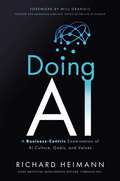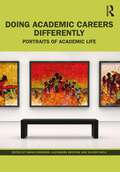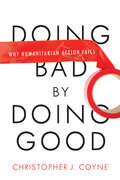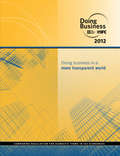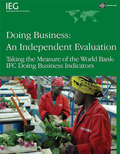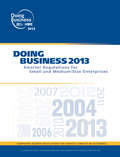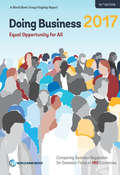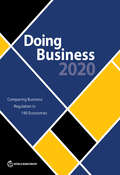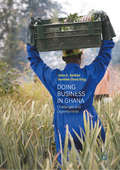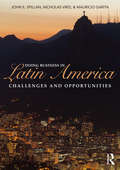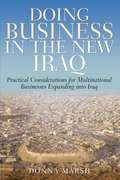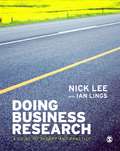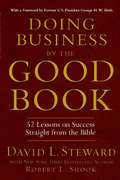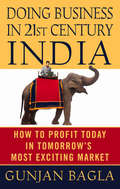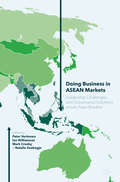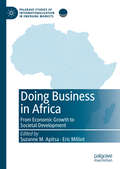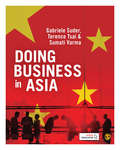- Table View
- List View
Dogs Don’t Bark at Parked Cars: Your GPS in an Era of Hyper-Change
by Eric Wright Jeff PiersallSome attribute it to Aristotle, but whether the great Greek philosopher said it or not doesn’t affect its timeless truth. “If you want to avoid criticism, all you have to do is say nothing, do nothing and be nothing.” If on the other hand, you decide your life is purposed for something worthy and being on the playing field is preferred to sitting in the stands, there is something you are sure to encounter; what Jeff Piersall and Eric Wright call “barking dogs.”Dogs Don’t Bark at Parked Cars illustrates this encounter as the voices that find fault, who don’t think it’s possible, who are unable to see a future alive with opportunities waiting to be seized. They are the ones governed by fear instead of faith. Unfortunately, many times the loudest of these barking dogs are kenneled right in most people’s own heads. For Jeff and Eric, that priceless quality is wisdom. It goes beyond knowledge or aptitude and transcends this era of cultural and technological hyper-change, with principles that are timeless.
Dogs and Demons: Tales from the Dark Side of Japan
by Alex KerrThe crises--and failures--of modernization in Japan, as seen up close by a resident expertJapan is a nation in crisis, and the crisis goes far beyond its well-known economic plight. In Dogs and Demons, Alex Kerr chronicles the crisis on a broad scale, from the failure of Japan's banks and pension funds to the decline of its once magnificent modern cinema. The book takes up for the first time in the Western press subjects such as the nation's endangered environment--its seashores lined with concrete, its roads leading to nowhere in the mountains. It describes Japan's "monument frenzy," the destruction of old cities such as Kyoto and construction of drab new cities, and the attendant collapse of the tourist industry.All these unhealthy developments are, Kerr argues, the devastating boomerang effect of an educational and bureaucratic system designed to produce manufactured goods--and little else. A mere upturn in economic growth will not quickly remedy these severe internal problems, which Kerr calls a "failure of modernism." He assails the foreign experts who, often dependent on Japanese government and business support, fail to address these issues. Meanwhile, what of the Japanese people themselves? Kerr, a resident of Japan for thirty-five years, writes of them with humor and passion, for "passion," he says, "is part of the story. Millions of Japanese feel as heartbroken at what is going on as I do. My Japanese friends tell me, 'Please write this--for us.'"
Dogs in the Leisure Experience
by Neil CarrThis book explores the social and cultural constructions and debates of what are dogs and what is leisure. It looks at how working dogs play a significant role in leisure experiences such as ensuring the safety of air transport, and considers the differing roles and changing acceptance of dogs' involvement in sport. Within the setting of the animal welfare and sentience debates, it examines the leisure needs of dogs and their owners. Providing an original contribution to our understanding of dogs as both participants and objects in the leisure experience, this book is a useful resource for researchers in leisure, hospitality and tourism.
Dogs in the Leisure Experience
by Neil CarrThis book explores the social and cultural constructions and debates of what are dogs and what is leisure. It looks at how working dogs play a significant role in leisure experiences such as ensuring the safety of air transport, and considers the differing roles and changing acceptance of dogs’ involvement in sport. Within the setting of the animal welfare and sentience debates, it examines the leisure needs of dogs and their owners. Providing an original contribution to our understanding of dogs as both participants and objects in the leisure experience, this book is a useful resource for researchers in leisure, hospitality and tourism.
Dogs of the Dow
by James Weber Samuel G. Hanson Malcolm P. BakerThis case describes the Dogs of the Dow investment strategy, value investing, and using dividend yields as a means to determine intrinsic value. It also describes exchange traded notes and a particular exchange traded note, known as the Dogs of the Dow, which tracks the performance of the 10 highest yielding stocks of the 30 stocks that make up the Dow Jones Industrial Average (DJIA). The case provides share price data, dividend data, and financial statement data on the 30 DJIA companies to enable students to perform their own calculations.
Dogus Group: Weighing Partners for Garanti Bank
by Tarun Khanna Krishna G. Palepu Richard J. BullockIn August 2005, the leadership of Turkey's Dogus Group considered opportunities for its flagship enterprise, Garanti Bank, to partner with a foreign financial institution. The case describes the Turkish banking industry and Garanti Bank's position within it, and asks students to consider whether partnership makes sense for Garanti and, if so, which bidder it should select.
Doing AI: A Business-Centric Examination of AI Culture, Goals, and Values
by Richard HeimannArtificial intelligence (AI) has captured our imaginations—and become a distraction. Too many leaders embrace the oversized narratives of artificial minds outpacing human intelligence and lose sight of the original problems they were meant to solve. When businesses try to &“do AI,&” they place an abstract solution before problems and customers without fully considering whether it is wise, whether the hype is true, or how AI will impact their organization in the long term. Often absent is sound reasoning for why they should go down this path in the first place. Doing AI explores AI for what it actually is—and what it is not— and the problems it can truly solve. In these pages, author Richard Heimann unravels the tricky relationship between problems and high-tech solutions, exploring the pitfalls in solution-centric thinking and explaining how businesses should rethink AI in a way that aligns with their cultures, goals, and values. As the Chief AI Officer at Cybraics Inc., Richard Heimann knows from experience that AI-specific strategies are often bad for business. Doing AI is his comprehensive guide that will help readers understand AI, avoid common pitfalls, and identify beneficial applications for their companies. This book is a must-read for anyone looking for clarity and practical guidance for identifying problems and effectively solving them, rather than getting sidetracked by a shiny new &“solution&” that doesn&’t solve anything.
Doing Academic Careers Differently: Portraits of Academic Life
by Sarah Robinson Alexandra Bristow Olivier RatleShould academic careers always unfold in exactly the same way? Is there one best way of being an academic? This book says no. Assumptions about who academics are and what they should do are becoming increasingly narrow and focused on achieving so-called ‘excellence’ in teaching and research above anything else. This book problematises this and explores the scope for doing academic careers differently. Authors paint individual or group portraits of their academic careers, working with metaphors which challenge the dominant discourses of how academic careers should be led. From rejecting the pressure to focus on ‘one big thing’, to prioritising nurture and care, transcending disciplinary boundaries, reshaping own daily practice, connecting with communities, and being academics outside academia, the chapters in this book offer those considering, starting, or developing an academic career a treasure trove of many alternative possibilities. Presented as a portrait gallery through which readers are encouraged to meander at will, this compilation of insights into alternative academic lives will help to inspire and encourage current academics to re-think and take ownership of their careers in their own terms, according to their own strengths, weaknesses, and circumstances.
Doing Bad by Doing Good: Why Humanitarian Action Fails
by Christopher J. CoyneIn 2010, Haiti was ravaged by a brutal earthquake that affected the lives of millions. The call to assist those in need was heard around the globe. Yet two years later humanitarian efforts led by governments and NGOs have largely failed. Resources are not reaching the needy due to bureaucratic red tape, and many assets have been squandered. How can efforts intended to help the suffering fail so badly? In this timely and provocative book, Christopher J. Coyne uses the economic way of thinking to explain why this and other humanitarian efforts that intend to do good end up doing nothing or causing harm. In addition to Haiti, Coyne considers a wide range of interventions. He explains why the U.S. government was ineffective following Hurricane Katrina, why the international humanitarian push to remove Muammar Gaddafi in Libya may very well end up causing more problems than prosperity, and why decades of efforts to respond to crises and foster development around the world have resulted in repeated failures. In place of the dominant approach to state-led humanitarian action, this book offers a bold alternative, focused on establishing an environment of economic freedom. If we are willing to experiment with aid—asking questions about how to foster development as a process of societal discovery, or how else we might engage the private sector, for instance—we increase the range of alternatives to help people and empower them to improve their communities. Anyone concerned with and dedicated to alleviating human suffering in the short term or for the long haul, from policymakers and activists to scholars, will find this book to be an insightful and provocative reframing of humanitarian action.
Doing Business
by World BankDoing Business presents quantitative indicators on business regulations and the protection of property rights that can be compared across 183 economies--from Afghanistan to Zimbabwe--and over time. Regulations affecting 10 stages of a business's life are measured: starting a business, dealing with construction permits, employing workers, registering property, getting credit, protecting investors, paying taxes, trading across borders, enforcing contracts and closing a business.
Doing Business -- An Independent Evaluation
by World BankThis independent evaluation of the Doing Business Indicators assesses the methods and processes used to construct the indicators, their relevance to development outcomes, and their usefulness to policy makers and other stakeholders. It makes recommendations for improving the collection and presentation of data and for greater clarity in communicating what the indicators can and cannot capture.
Doing Business 2013: Smarter Regulations for Small and Medium-Size Enterprises
by World BankTenth in a series of annual reports comparing business regulation in 185 economies, Doing Business 2013 measures regulations affecting 11 areas of everyday business activity: starting a business, dealing with construction permits, getting electricity, registering property, getting credit, protecting investors, paying taxes, trading across borders, enforcing contracts, closing a business, and employing workers. The report updates all indicators as of June 1, 2012, ranks economies on their overall "ease of doing business", and analyzes reforms to business regulation - identifying which economies are strengthening their business environment the most. The Doing Business reports illustrate how reforms in business regulations are being used to analyze economic outcomes for domestic entrepreneurs and for the wider economy. This year marks the tenth anniversary of the global Doing Business report. Doing Business is a flagship product by the World Bank and IFC that garners worldwide attention on regulatory barriers to entrepreneurship. More than 60 economies use the Doing Business indicators to shape reform agendas and monitor improvements on the ground. In addition, the Doing Business data has generated over 870 articles in peer-reviewed academic journals since its inception.
Doing Business 2017: Equal Opportunity for All
by World BankFourteenth in a series of annual reports comparing business regulation in 190 economies, Doing Business 2017 measures aspects of regulation affecting 10 areas of everyday business activity: * Starting a business * Dealing with construction permits * Getting electricity * Registering property * Getting credit * Protecting minority investors * Paying taxes * Trading across borders * Enforcing contracts * Resolving insolvency These areas are included in the distance to frontier score and ease of doing business ranking. Doing Business also measures features of labor market regulation, which is not included in these two measures. This year's report introduces major improvements by expanding the paying taxes indicators to cover postfiling processes--tax audits, tax refunds and tax appeals--and presents analysis of pilot data on selling to the government which measures public procurement regulations. Also for the first time this year Doing Business collects data on Somalia, bringing the total number of economies covered to 190. Using the data originally developed by Women, Business and the Law, this year for the first time Doing Business adds a gender component to three indicators--starting a business, registering property, and enforcing contracts--and finds that those economies which limit women's access in these areas have fewer women working in the private sector both as employers and employees. The report updates all indicators as of June 1, 2016, ranks economies on their overall "ease of doing business ?, and analyzes reforms to business regulation " identifying which economies are strengthening their business environment the most. Doing Business illustrates how reforms in business regulations are being used to analyze economic outcomes for domestic entrepreneurs and for the wider economy. It is a flagship product produced in partnership by the World Bank Group that garners worldwide attention on regulatory barriers to entrepreneurship. More than 137 economies have used the Doing Business indicators to shape reform agendas and monitor improvements on the ground. In addition, the Doing Business data has generated over 2,182 articles in peer-reviewed academic journals since its inception.
Doing Business 2020 (Doing Business)
by World BankDoing Business 2020 is the 17th in a series of annual studies investigating the regulations that enhance business activity and those that constrain it. It provides quantitative indicators covering 12 areas of the business environment in 190 economies. The goal of the Doing Business series is to provide objective data for use by governments in designing sound business regulatory policies and to encourage research on the important dimensions of the regulatory environment for firms.
Doing Business In Ghana
by John E. Spillan Domfeh Obed KingThis book provides a thorough perspective on the realities of doing business in Ghana, outlining the economic, social, technological, and cultural dimensions of the society. It offers insight for entrepreneurs into the region's markets based on GDP growth, political and governmental systems, relationships with investors, and other factors. Considered a beacon of hope for Africa, Ghana is a country with a competitive labor force, stable political environment, and lots of economic opportunities for new business ventures. This book will offer academics a good understanding of the major issues affecting business development in Ghana, and inform students, scholars, managers, and leaders on the paths necessary to pursue launching a product or service in Africa.
Doing Business In Latin America: Challenges and Opportunities
by John E. Spillan Nicholas Virzi Mauricio GaritaSuccess in today's globalized business environment requires deep knowledge of varied areas, and the willingness to engage in commerce not just across geographic areas, but cross-culturally and environmentally as well. Doing Business in Latin America offers an in-depth look at a complex region, integrating practitioners’ and scholars’ ideas to examine business conducted in Latin America through the lens of international business and globalization. The book introduces, discusses, and explains in detail the historical, economic, cultural, political, and technological impacts of globalization and business conduct in Latin American countries. It also considers the contemporary business environment of the area, looking at how current country and regional factors have affected the process of starting and operating businesses. Finally, it looks forward to the emerging trends that portend the future of business in these countries. With its combination of contemporary analysis and historical discussion, this book is a vital tool to all scholars and practitioners with an interest in the opportunities offered by the current Latin American business environment.
Doing Business In The New Iraq: Practical Considerations For Multinational Businesses Expanding Into Iraq
by Donna MarshIraq, with its educated, sophisticated and relatively wealthy population, has been effectively off limits to most outsiders for the past 30 years. However, with the scaling down of violent activity and the establishment of a new, albeit fragile government, many multinational companies are giving serious consideration to setting up a presence in this market. This book provides cultural and business intelligence for all organisations who are considering doing business in Iraq. All of the practical issues of working in this exciting yet challenging environment are addressed, from safety issues to establishing reliable business partners, and including thoughts about the future. It includes: - A brief overview of Iraq - geography, demographics, structure, economy,weather - Religious demographics in Iraq, and their effect on business and other practicalities - Travelling to Iraq - practical and regional considerations - How to communicate effectively in Iraq - Getting down to business and achieving business goals - The impact of globalisation in Iraq and throughout the greater Middle East
Doing Business In The New Iraq: Practical Considerations for Multinational Businesses Expanding into Iraq
by Donna MarshIraq, with its educated, sophisticated and relatively wealthy population, has been effectively off limits to most outsiders for the past 30 years. However, with the scaling down of violent activity and the establishment of a new, albeit fragile government, many multinational companies are giving serious consideration to setting up a presence in this market. This book provides cultural and business intelligence for all organisations who are considering doing business in Iraq. All of the practical issues of working in this exciting yet challenging environment are addressed, from safety issues to establishing reliable business partners, and including thoughts about the future. It includes: - A brief overview of Iraq - geography, demographics, structure, economy,weather - Religious demographics in Iraq, and their effect on business and other practicalities - Travelling to Iraq - practical and regional considerations - How to communicate effectively in Iraq - Getting down to business and achieving business goals - The impact of globalisation in Iraq and throughout the greater Middle East
Doing Business Research: A Guide to Theory and Practice
by Nick Lee Ian Lings`It′s not often that you′ll find an article or book that explains what you need to know in such plain, simple terms. Treasure it′ - Andrew Farrell, Doctoral Researcher, Loughborough University `Entertaining and authoritative without being patronising′ - Professor Chris Hackley, Royal Holloway, University of London `This is a gem of a book from two of the outstanding management researchers of their generation. Easy to read and entertaining, yet rigorous and comprehensive in its approach, this book will be adopted as an essential aid for students undertaking final year projects, masters dissertations, and as a primer for doctoral researchers′ - Professor Graham Hooley, Aston University `This book will fill a vital gap for post graduate research′ - Professor Rod Brodie, University of Auckland Business School For anyone involved in developing a research project, this textbook provides an integrated, accessible and humorous account that explains why research methods are the way they are and how they do what they do. Unrivalled in its nature Doing Business Research addresses the research project as a whole and provides: - essential detail of philosophical and theoretical matters that are crucial to conceptualising the nature of methodology - a pragmatic guide to why things are important and how they are important - a huge range of things to consider that the reader can use to develop their research project further - a resource book, providing extensive suggested reading to help the researcher do their research.
Doing Business by the Good Book: 52 Lessons on Success Straight from the Bible
by Robert L. Shook David StewardAn indispensable volume that shows how to succeed in business by using the Bible and its lessons as a source of inspiration and guidance n 1990, David L. Steward founded his company, Worldwide Technology, Inc., on a shoestring budget and borrowed money, well aware of the high-risk nature of the venture he was undertaking. Despite the fact that he was a novice entrepreneur, he was certain he would succeed. Steward believed intensely that God wouldn't let him down.Doing Business by the Good Book shares the inspiring lessons culled straight from the Bible, that Steward used to build his privately held billion-dollar company into a global information technology enterprise.
Doing Business in 21st-Century India: How to Profit Today in Tomorrow's Most Exciting Market
by Gunjan BaglaBy now, you probably know that India has the second-fastest growing economy in the world. That the spending power of its middle class is rapidly increasing and its population is eager to acquire Western conveniences. And that new opportunities abound in its many emerging sectors. But buyer (or seller) beware--India is not simply "the new China." Important cultural differences and other hurdles can make for a challenging business landscape for Westerners. Fortunately, longtime global sourcing and marketing expert Gunjan Bagla now delivers the vital advice you need. Doing Business in 21st-Century India will show you how to make inroads into and thrive in this developing region with information that includes: An overview and analysis of India's most promising industries The Six C's of Sales and Marketing in India Essential tips on attracting and retaining top talent An overview of finance in the region that every investor will want to read Modern history 101--the essentials you need to know Insider perspective from top veteran professionals in the region Guidance on its often complex, laws, rules, and regulations. Concise, accessible, and indispensible, Doing Business in 21st-Century India is the perfect primer for anyone who's long on enterprise, short on time, and eager to profit from this fascinating new market.
Doing Business in ASEAN Markets: Leadership Challenges and Governance Solutions across Asian Borders
by Peter Verhezen Ian Williamson Mark Crosby Natalia SoebagjoThe authors of this important book analyse the pitfalls and risks of doing business in ASEAN countries that are mostly absent in Western markets, covering various strategic, external, operational, and legal-cultural challenges for international companies. Doing Business in ASEAN Emerging Markets crucially addresses how to resolve those barriers. Encompassing issues of governance and leadership standards, the authors present case studies and practical solutions underpinned by academic research. Helping executives learn how to implement high international standards and maintain sensitivity to socio-cultural and political Asian contexts, the book highlights the need to create an international diverse and unified leadership team that will take better decisions and effectively deal with risks, and apply best corporate governance practices within an Asian context.
Doing Business in Africa: From Economic Growth to Societal Development (Palgrave Studies of Internationalization in Emerging Markets)
by Eric Milliot Suzanne M. ApitsaThis book presents insights from cutting-edge international business and management research relating to Africa. Economic growth and foreign investment in the region remains strong, despite some slowing down in recent years. This trend of economic growth and its impact on international trade and FDI has attracted Western businesses, eager to capitalize on this emerging market. In this context, new relationships and interactions have stimulated business research on Africa. Split into four parts covering the internationalization process, international logistics, trans-border corporate social responsibility and trust in Africa, the book covers a range of emerging trends, academic discussion and evolving issues across the spectrum of business research. It is a valuable read for students, researchers and practitioners interested in doing business in Africa.
Doing Business in Asia
by Dr. Gabriele Suder Terence Tsai Sumati VarmaFrom the author of Doing Business in Europe (SAGE, 2018), Gabriele Suder has teamed up with Sumati Varma based in India, and Terence Tsai from China to bring this comprehensive solution for Asian business teaching and learning. The book offers a highly productive mix of international business and marketing theory, and is packed with pedagogical tools to engage and develop understanding, including two full-length corporate case studies per chapter. This is a unique volume covering the most relevant topics of Asia-focused business and management practice spanning from cross-cultural management to supply chain resilience to market entry and expansion strategy, and much more. Specifically designed to meet the needs of Postgraduate, MBA and those taking part in Executive Education programmes, this exciting learning experience will prepare Asia's leaders of the future.
Doing Business in Asia
by Dr. Gabriele Suder Terence Tsai Sumati VarmaFrom the author of Doing Business in Europe (SAGE, 2018), Gabriele Suder has teamed up with Sumati Varma based in India, and Terence Tsai from China to bring this comprehensive solution for Asian business teaching and learning. The book offers a highly productive mix of international business and marketing theory, and is packed with pedagogical tools to engage and develop understanding, including two full-length corporate case studies per chapter. This is a unique volume covering the most relevant topics of Asia-focused business and management practice spanning from cross-cultural management to supply chain resilience to market entry and expansion strategy, and much more. Specifically designed to meet the needs of Postgraduate, MBA and those taking part in Executive Education programmes, this exciting learning experience will prepare Asia's leaders of the future.




